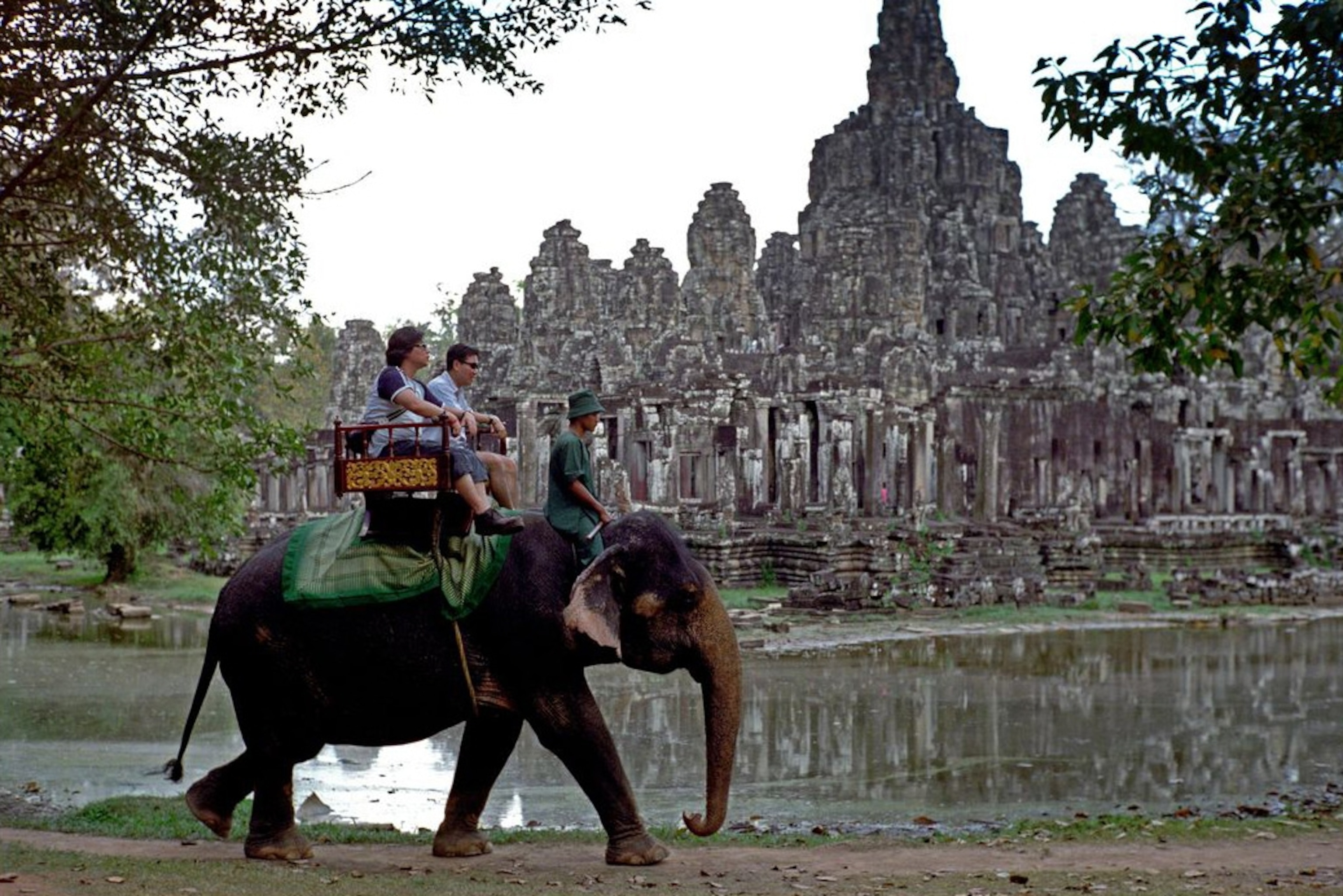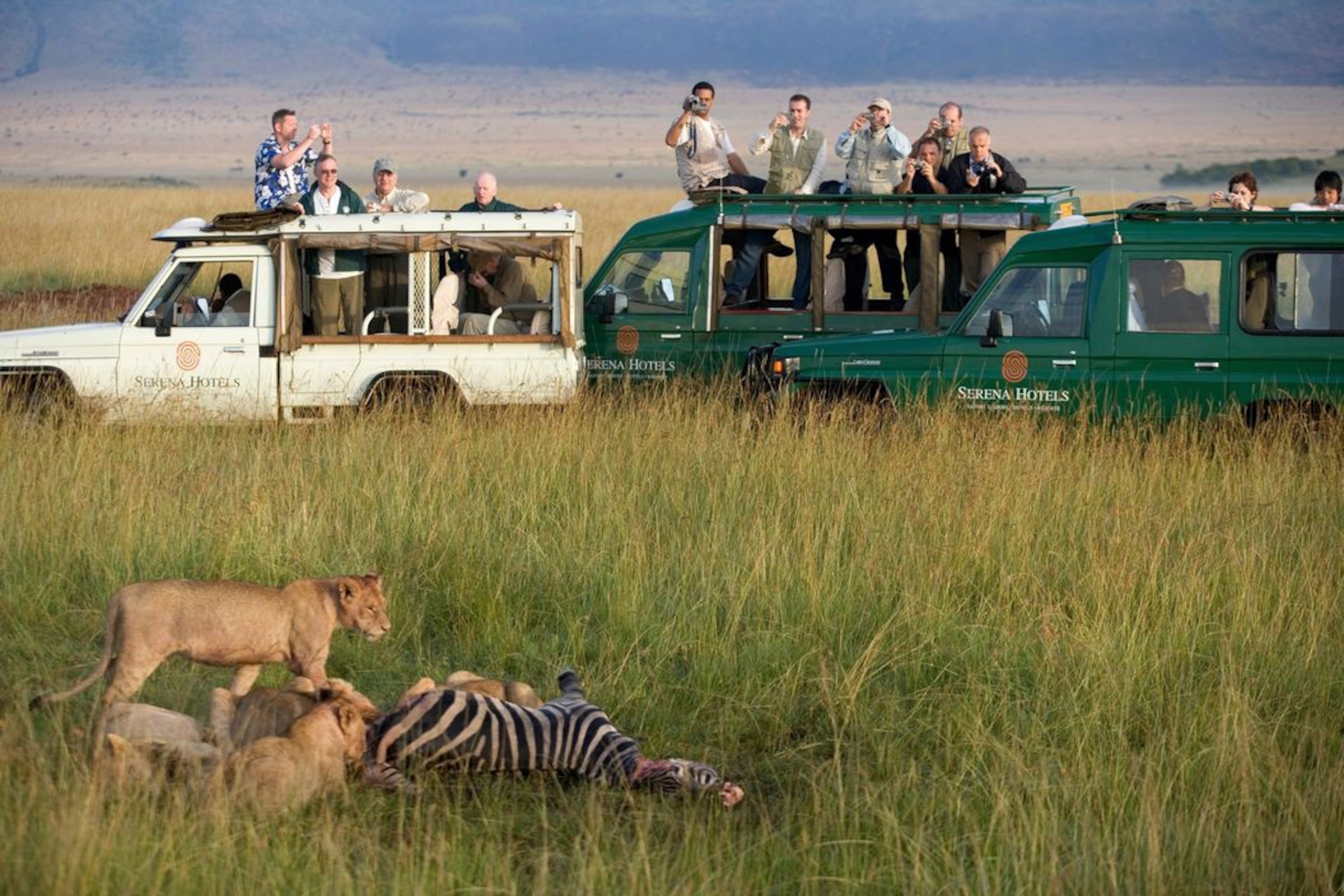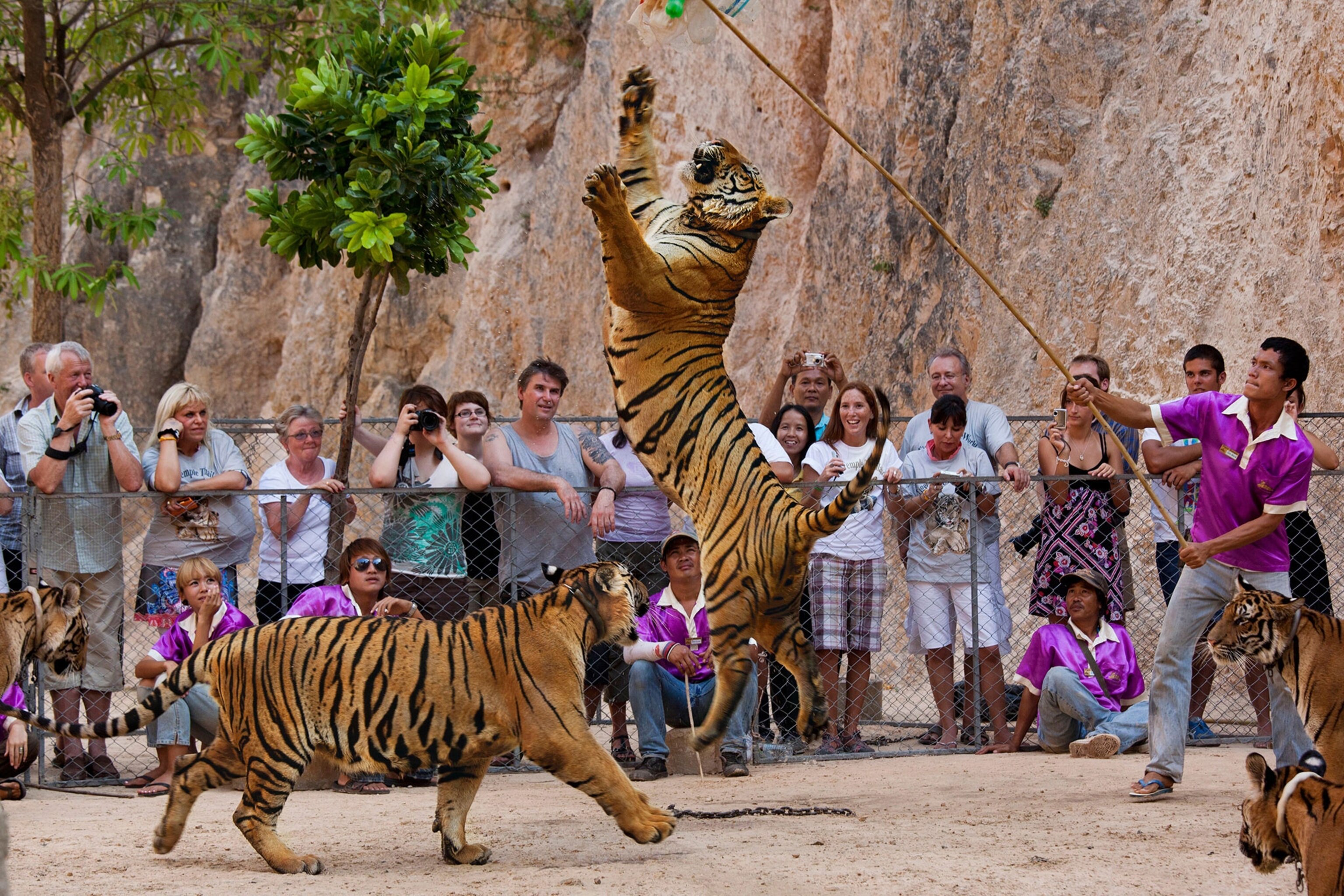
TripAdvisor Accused of Promoting Cruel Animal Attractions
The travel website has come under fire from animal welfare advocates for promoting and profiting from inhumane wildlife attractions.
Amid a wave of companies making pledges to support wildlife conservation and fight trafficking, one business has taken a different route. TripAdvisor, the world’s biggest travel website, is resisting claims that it has a responsibility to influence tourists' behavior by steering them away from cruel and inhumane attractions.
TripAdvisor has come under criticism from World Animal Protection, a UK-based animal welfare nonprofit, who say it profits from wildlife exploitation and cruelty, ranging from selling tickets to inhumane wildlife attractions through its subsidiary Viator to not taking animal welfare into account when ranking popular tourist attractions.
More than 250,000 people have signed a petition from World Animal Protection, calling on the company to stop selling tickets to certain attractions and to change its ranking algorithms so that cruel wildlife attractions won’t show up at the top of its popularity index or be awarded the Certificate of Excellence, which is based on customer reviews.
For its part, TripAdvisor told National Geographic, “The fact that a business or establishment is listed on the site does not represent our endorsement.” It’s up to travelers to share their candid feedback on attractions, said Desiree Fish, a TripAdvisor spokeswoman. That way, if they have a bad experience or concerns about animal welfare, they can share their assessments with others to shine a light on bad practices.
The average tourist doesn’t have the capacity to identify cruelty to animals because sometimes that cruelty is not overt.Adam Roberts, Born Free USA
As it turns out, however, tourists aren’t always adept at judging whether a wildlife attraction is humane, according to research. Last year, World Animal Protection and Oxford University’s Wildlife Conservation Research Unit (WildCRU) analyzed TripAdvisor reviews to see how tourists’ perceptions of an attraction, ranging from elephant rides to shark cage diving to wildlife sanctuaries, compared to animal welfare experts’ opinions.
“Some of the most concerning types of wildlife attractions ... received overwhelmingly positive reviews from tourists,” Neil D’Cruze, one of the study’s authors and the head of research at World Animal Protection, told National Geographic last year.
At the time, TripAdvisor reportedly had been talking with World Animal Protection about implementing a stamp-of-approval system for wildlife attractions similar to its GreenLeaders program, in which eco-conscious hotels get a little green leaf next to their listings.
But the talks went nowhere. Kate Nustedt, World Animal Protection’s wildlife campaign director, said there has been no follow-through from TripAdvisor. TripAdvisor’s Fish said it would be a very complex endeavor because there is “no feasible means by which an Internet site like [TripAdvisor] could centrally audit such practices around the globe.”
Hidden Cruelty
Most people who want to interact with wild animals on vacation are actually animal lovers. Most people just don’t realize why certain activities are bad for animals.

“The average tourist doesn’t have the capacity to identify cruelty to animals because sometimes that cruelty is not overt,” says Adam Roberts, the CEO of Born Free USA, an animal advocacy nonprofit based in Washington, D.C.
Elephant rides, for example, may not seem inherently cruel. How much can it bother the huge elephant to trek people through forests in Cambodia? But it took a lot to make that elephant compliant. A baby elephant being trained to work with tourists must first go through a “training crush.” National Geographic reported on the crush ritual in Thailand:
For example, elephants in the crush are taught to raise their feet on command so owners can easily move them. Men give orders enforced by stabbing at the animals' legs with sticks that have nails on the end. Mistakes are punished with beatings.
Elephants are typically covered in bloody wounds and rope burns when released from the crush after three to six days. They are quickly tied up again; the training continues for weeks.
While an adult elephant taking tourists for rides may (or may not) be treated more humanely after the crush, the truth is that almost all domesticated elephants go through this process in some form. Furthermore, elephants are sometimes taken from the wild to supply animals for these kinds of camps and treks, and they’re not bred to be ridden. Carrying tourists can cause spinal problems and skin sores, and often elephants are made to labor long hours without food, water, or rest.
Other practices may seem more obviously inhumane, such as bear-bile farming, where Asiatic black bears are kept in small cages hooked up to catheters to drain bile from their gallbladders in a painful and invasive process. In Asia, such farms make extra money by selling tickets to tourists who want to see the bears up close.
Many wildlife tourist attractions don’t seem too bad on the surface: swimming with dolphins, orca shows, or even photo opportunities with lions, tigers, and monkeys. But animals at these attractions are often kept in unnatural, confined, and sometimes unsuitable environments and lack adequate veterinary care. Interactions with humans can cause psychological and physical trauma, which can shorten life spans and result in more wild animals entering the industry.
Travel Companies Can Help
The travel industry is catching on to the idea that promoting or profiting off these activities is both irresponsible from a conservation perspective and unwise from a business perspective.
More than a hundred travel companies have pledged to end the sale of tickets to elephant rides and shows.World Animal Protection
“There’s a real movement starting to happen in the travel industry,” Nustedt says. “They’re starting to wake up and realize it’s not OK to profit on this wildlife cruelty.”
JetBlue, for example, will soon begin showing a video on each of its flights to educate tourists about the illegal wildlife trade, National Geographic reported in March. And both Royal Caribbean and Carnival Cruises have pledged to take steps to eliminate wildlife exploitation and trafficking in their businesses as well.
These companies may be responding in part to consumer demand.
“We’re experiencing a paradigm shift where we’re seeing a consumer demand for responsible alternatives, especially when it comes to animal welfare,” says Samantha Hogenson, managing director at the Center for Responsible Travel (CREST), a policy research organization that promotes responsible tourism.

Travel companies such as TripAdvisor have the opportunity to play an outsize role in combating wildlife exploitation, says Rod Cuthbert, the CEO of Rome2rio, a company that helps tourists plan transportation during their travels.
“People start their web searches with questions on Google like, ‘things to do in Thailand,’” Cuthbert says. TripAdvisor is usually one of the top results, with a 10-best list of attractions. “People are looking for guidance. When you end up with elephant rides at the top of those lists, it plays an important role in setting what a tourist’s priorities are.”
Cuthbert comes at the controversy from a unique perspective. He’s the founder and former CEO of Viator, the company now owned by TripAdvisor that sells tickets to tourist attractions—including elephant rides, tiger petting, shark cage diving, walks with lions, and more.
When he started Viator back in 1995, he says he didn’t know any better.
“We sold tens of thousands of tickets to elephant rides and all sorts of places,” he says. “Now that I’ve had the opportunity to get educated about these sorts of things, I feel a great deal of embarrassment and disappointment that I didn't spend time thinking it through.”
More than a hundred travel companies have pledged to end the sale of tickets to elephant rides and elephant shows, World Animal Protection announced in March. Now the group is calling on TripAdvisor to step up to join them.
Fish, the TripAdvisor spokeswoman, told National Geographic’s Wildlife Watch that efforts would be better focused on lobbying governments, not websites, to ensure that wildlife attractions follow the law and to improve regulations.
TripAdvisor has the opportunity to be on the front side of this, or they can end up being the followers.Samantha Hogenson, Center for Responsible Travel
The problem is that in many cases an attraction can be both legal and cruel. Take elephant rides. There’s no question that the crush is inhumane, but in Thailand, domestic elephants are treated under the law as livestock, not wildlife, and thus have many fewer protections. And China has no animal welfare laws at all.
Cuthbert says he doesn’t blame management for not yet getting educated on animal welfare. “I don’t think you can be mad at the people who are in the business now,” he said. “It’s a fast-moving, competitive space.”
If this is something consumers want, TripAdvisor and other travel companies in the same boat will have to pay attention. “I think if in six months’ time their policy is the same, I’d then be really disappointed,” he says. “But I don’t think it’ll take that long.”
CREST’s Hogenson agrees. “TripAdvisor has the opportunity to be on the front side of this, or they can end up being the followers,” she says. “But one way or another, they’re going to have to come on board in some way.”
What You Can Do
Between 3.6 million to six million people visit wildlife attractions worldwide every year. You can make sure that the ones you decide to visit do no harm.
- Look for activities, such as safaris, where the animals are in their natural environment.
- Avoid places that offer hands-on interactions with animals.
- Avoid places that have performing animals, such as circuses and sea aquariums.
Animal sanctuaries can be among the best sites to visit. Researchers with World Animal Protection and WildCRU found that they tend to have fewer animal welfare concerns and are more likely to promote wildlife conservation in meaningful ways.
Before you book a tour, find out if the operator has an animal welfare policy. And be sure to research specific attractions ahead of time:
- How are the animals cared for?
- Where are they from?
- Do the animals have access to food, water, and shelter from the sun?
- Are they engaging in natural activities?
For more tips, check out World Animal Protection’s guide to an animal-friendly vacation.
If you are concerned about an animal you see, you can report it to the nonprofit Born Free. Fill out the Travelers' Animal Alert form on their website, and they’ll investigate.
This story was produced by National Geographic’s Special Investigations Unit, which focuses on wildlife crime and is made possible by grants from the BAND Foundation and the Woodtiger Fund. Read more stories from the SIU on Wildlife Watch. Send tips, feedback, and story ideas to ngwildlife@natgeo.com.